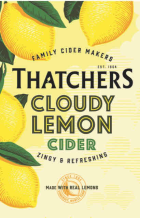
In the latest development in the battle of brands (“Good”) against lookalikes (“Evil”), a judgment was handed down in IPEC today (24 January 2024), dismissing a trade mark infringement claim brought by Thatchers against serial lookalike producer, Aldi.
Thatchers had claimed that the getup for Aldi’s Taurus cloudy lemon cider (“the Aldi Sign”) infringed the device mark artwork (“the Thatchers Mark”) for Thatchers Cloudy Lemon Cider pursuant to sections 10(2)(b) and 10(3) of the Trade Marks Act 1994 and it further claimed passing off.


The Thatchers Mark The Aldi Sign
Her Honour Judge Melissa Clarke, sitting in IPEC, found that, while the Thatchers Mark has gained reputation and enhanced distinctiveness (for all of its combined elements, including the non-distinctive parts) in the UK:
- the Aldi Sign has a low degree of similarity to the Thatchers Mark;
- there is no likelihood of confusion;
- while Aldi’s use of the Aldi Sign was intentional benchmarking to the Thatchers Mark and has caused a link in the mind of the average consumer between the Aldi Sign and the Thatchers Mark,Aldi’s use of the Aldi Sign does not take unfair advantage of and is not detrimental to the repute of the Thatchers Mark; and
- accordingly Aldi is not liable in trade mark infringement or passing off.
We find the reasoning for (3) to be very disappointing and unpick the judgment as follows.
Assessment of similarity– where is the science?
We have been following this case closely and consider the finding of ‘low degree of similarity’ to be surprising. The judge’s reasoning was that she was “satisfied that the principal dominating features of both marks are the “THATCHERS” brand on the Trade Mark and the “TAURUS” brand and bulls head device on the Sign which are dissimilar”.
However, her finding that the brand names are the dominant features of both products, flies in the face of consumer behavioural science. Stobbs recently commissioned “The Psychology of Lookalikes” report to review the consumer behavioural science research around packaging. The report concludes that, contrary to the views of the UK judiciary – as exemplified in this latest decision - colour and stylisation of product packaging are far more important to consumer recognition of packaging than brand name.
An unfair decision on unfair advantage?
Although noting that intention is not required for an unfair advantage claim, the judge found that on balance she was satisfied that Aldi did not develop its product with an intention to take advantage of the goodwill and reputation in the Thatchers Mark. This is despite her finding that Aldi had used the Thatchers product as a benchmark for the Aldi product’s packaging.
The judge noted that “the question is whether the similarities that I have found between the Sign and the Trade Mark have caused consumers to change their economic behaviour (a likelihood of change not being relevant in this case where the Aldi Product is no longer on the market). Thatchers have not satisfied me that is the case.”
These findings were based on a number of factors, including that Aldi had not departed from its house style for the pre-existing TAURUS range and that Aldi was trying to adopt packaging which was “a safe distance away”.
We find this to be a somewhat flawed approach to an unfair advantage claim – where there is a clear finding of benchmarking and creating a link, is it really enough for a Defendant to simply say “ahh I didn’t mean to infringe so I wasn’t acting unfairly”?
A further issue with the judge’s unfair advantage analysis is her finding that the evidence of the sales achieved by Aldi for the Aldi Sign product do not look disproportionate in relation to sales of other ciders in the Taurus Family, and that evidence from the Thatchers witness - that such a level of sales for a new Aldi lemon cider is astonishing and can only result from unfair advantage resulting from Thatchers’ investment in the promotion and marketing of the Trade Mark - amount to little more than supposition.
This seems to us to be a misunderstanding of the law of unfair advantage: the assessment cannot be whether the Aldi product sold disproportionately more than other ciders in its Taurus range, but whether its sales of the Taurus cloudy lemon were higher than they would have been if they had chosen different packaging which did not mimic Thatchers’ well-known packaging with a reputation and distinctive character.
What now?
IP Judges are all too often (and this judgment is the perfect example) viewing packaging through the lens of a forensic IP lawyer, rather than considering and acknowledging how consumers actually respond to packaging. It is not all about the brand name (here, TAURUS) to the consumer – it is about the colour, artwork, shape and get-up of the packaging which inspires trust, recognition and loyalty amongst consumers. No consumer would think that the TAURUS lookalike and the THATCHERS market-leader have low levels of similarity. The lookalikes battle continues and the answer lies in consumer behavioural science to educate the Judges on why brand name is not the be-all and end-all of packaging. The courts need to modernise and provide a path for brand owners to tackle serial copyists, in order to protect the substantial investment that brands put into the design and marketing of their packaging.
On a more positive note, the judge’s finding that the Thatchers mark as a whole (including a combination of non-distinctive elements) has distinctive character and reputation is good news for brand owners filing packaging marks. But on the unfair advantage assessment, we simply do not agree with the Judge.
When life gives you lemons…make an appeal!
Send us your thoughts:
Would you like to read more articles like this?
Building 1000
Cambridge Research Park
CB25 9PD
Fax. 01223 425258
info@iamstobbs.com
Privacy policy
German office legal notice
Cookie Declaration
Complaints Policy
Copyright © 2022 Stobbs IP
Registered Office: Building 1000, Cambridge Research Park, Cambridge, CB25 9PD.
VAT Number 155 4670 01.
Stobbs (IP) Limited and its directors and employees who are registered UK trade mark attorneys are regulated by IPReg www.ipreg.org.uk



